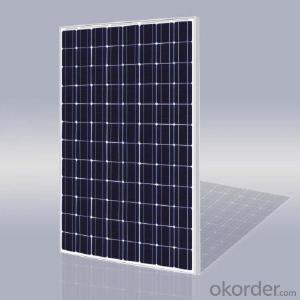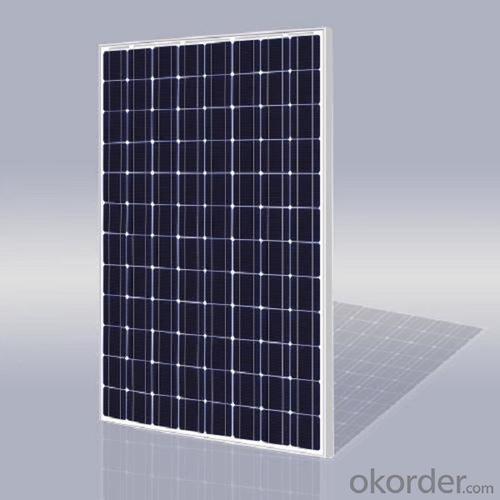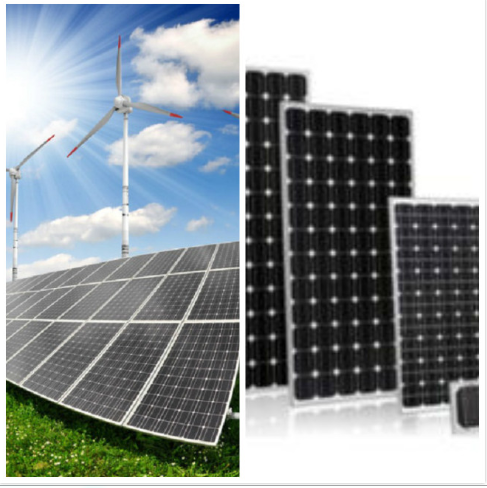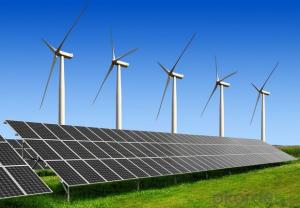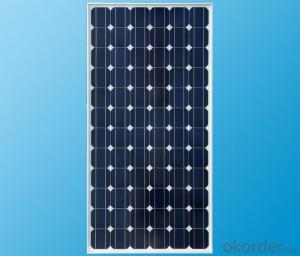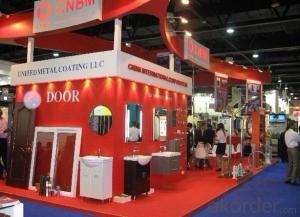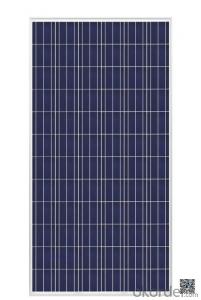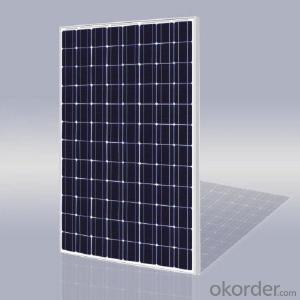Sailing Solar Panels - High Efficiency Solar Panel for Full Certificate
- Loading Port:
- Shanghai
- Payment Terms:
- TT OR LC
- Min Order Qty:
- 2650 watt
- Supply Capability:
- 26000 watt/month
OKorder Service Pledge
OKorder Financial Service
You Might Also Like
Specification
Product Description:
1.Structure of Solar Module Description
Solar panel refers either to a solar hot water panel, a common type of a solar thermal collector, or to one or more solar photovoltaics (PV) modules, electrically connected and mounted on a supporting structure.
A PV module is a packaged, connected assembly of typically 6×10 solar cells. Solar PV panels constitute the solar array of a photovoltaic systemthat generates and supplies solar electricity in commercial and residential applications. Each module is rated by its DC output power under standard test conditions, and typically ranges from 100 to 320 watts.
2.Main Features of the Solar Module
1).High conversion efficiencies resulting in superior power output performance.
2).Outstanding power output even in low light or high temperature conditions
3).Optimized design for ease of soldering and lamination
4).Long-term stability,reliability and performance
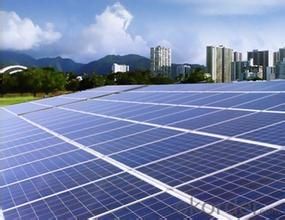
GENERAL SAFETY
1. Consult local codes and other applicable laws concerning required permits on regulations concerning installation and inspection requirements.
2. Before installation a PV module, contact appropriate authorities to determine permit, installation and inspection requirements that should be followed.
3. Install PV modules and ground frames in accordance with applicable rules and regulations
4. PV modules should be installed and maintained by qualified personnel. Only installer/service personnel should have access to the PV module installation site.
5. No matter where the PV modules are installed, either roof mounted construction or any other type of structures above the ground, appropriate safety practices should be followed and required safety equipment should be used in order to avoid possible safety hazards. Note that the installation of some PV modules on roofs may require the addition of fireproofing, depending on local building / fire codes.
6. Please use PV modules with same cell size within series.
- Q: Can solar panels store excess energy?
- No, solar panels cannot store excess energy.
- Q: Can solar panels be used for charging electric bicycles?
- Yes, solar panels can be used to charge electric bicycles. Solar panels convert sunlight into electricity, which can then be used to charge the batteries of electric bicycles. This eco-friendly and sustainable method of charging allows for convenient and cost-effective transportation.
- Q: How do solar panels affect the electrical grid?
- Solar panels affect the electrical grid by supplying clean and renewable energy. When solar panels generate excess electricity, it can be fed back into the grid, reducing the overall demand for fossil fuel-based power generation. This helps to stabilize the grid and reduce carbon emissions. However, the intermittent nature of solar power can create challenges for grid operators in managing variations in supply and demand.
- Q: I need to reduce the average monthly home electricity bill by powering some of the household appliances using solar panels. Can I use a 250 watt solar panel to power a medium sized upright fridge?
- How many watts does your fridge consume? Do you want it to work at night when the solar panels aren't doing anything? Probably not.
- Q: Say if i had a 2KW system is thtat just one big solar panel or does the whole system have little solarpanels together.?
- Solar panels are arrays of individual solar cells connected in series and parallel, and.. A high quality, monocrystalline silicon solar cell, at 25 °C cell temperature, may produce 0.60 volts open-circuit (Voc). The cell temperature in full sunlight, even with 25 °C air temperature, will probably be close to 45 °C, reducing the open-circuit voltage to 0.55 volts per cell. The voltage drops modestly, with this type of cell, until the short-circuit current is approached (Isc).
- Q: I've been thinking and I'd like to have solar panels installed on my roof at some point to help reduce our electricity consumption- but I live in IL and in the winter it frequently snows. Is there such a thing as heated solar panels so they don't get coated w/ice or snow? Are solar panels even a feasible option in IL? Thank you, Anna
- You can do solar anywhere and yes, they're a viable option in IL - as they are where I live - in Maine! We get snow and also lots of low light days in the winter. It's not as easy as say -having solar in New Mexico (self-identified as the solar capitol!) but - you can still generate a nice amount of electricity with your solar panels on a nice day in IL - and they're fine in the snow.
- Q: I want to also know if the 0 watt rating on the solar panel is 0 watts per day or is it constantly adding 0 watts? Is there a time which the 0 watts is being added like 0 watts per second or 0 watts per minute and so on?
- a 0w solar panel means at peak efficiency ( high noon, panel pointed flat at the sun, hitting it at 90 degrees), you will get 0 watts (at any given second). Watts = volts x amps a 2volt battery needs an incoming current of at least 3 volts to charge it; 3.5 volts is better. so if the output VOLTAGE of the panel is less than 3 volts it wont do anything. Even if it is, 0 / 3.5 = .74 amp.( three quarters). It will take forever and a day to charge a deeply discharged deep cycle battery.......... consider that a small 0v battery charger is putting out 3-5 amps ( or 3 x 0 =330 Watts) and the alternator on a car is putting out 20 to 50 amps at 4 volts ( 280 to 730 Watts).
- Q: Can solar panels be installed on outdoor event venues?
- Yes, solar panels can be installed on outdoor event venues. In fact, they are often a great choice for such venues as they can provide renewable energy to power various event equipment, lighting, and sound systems. Additionally, solar panels can help reduce the environmental impact of hosting events by reducing reliance on fossil fuels and decreasing carbon emissions.
- Q: Can solar panels be used to power a train?
- Yes, solar panels can be used to power a train. Solar panels generate electricity by converting sunlight into energy, which can be used to power various systems, including trains. However, the feasibility and efficiency of using solar panels to power a train will depend on several factors such as the size of the train, the available surface area for solar panel installation, the train's energy requirements, and the geographical location's solar potential.
- Q: Well, I am looking for a cheap way on building a solar panel, instead of buying by the manufacturing stores. I would like to stay in the budget up to ,000 dollars. I want to have Solar Energy for my house because the sun is always shining. Is there a way I can make the Light power some of my house? What would I need? How much time would it take?Where can I get the items I need?
- there is a website that sells a book for $40 thattells you how to do it cheaply check it out just google earth4energy
Send your message to us
Sailing Solar Panels - High Efficiency Solar Panel for Full Certificate
- Loading Port:
- Shanghai
- Payment Terms:
- TT OR LC
- Min Order Qty:
- 2650 watt
- Supply Capability:
- 26000 watt/month
OKorder Service Pledge
OKorder Financial Service
Similar products
Hot products
Hot Searches
Related keywords
